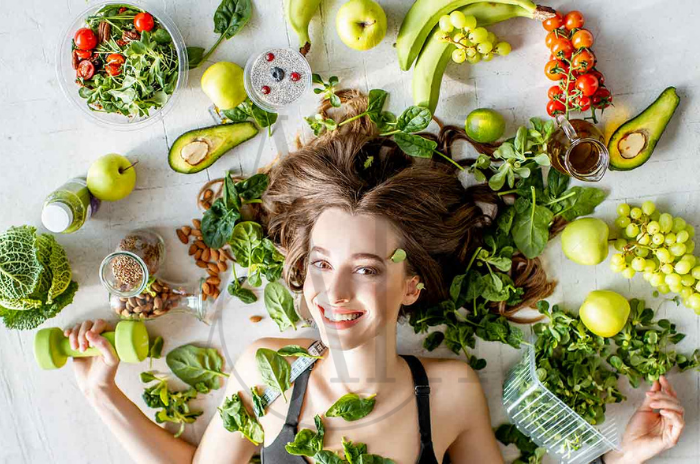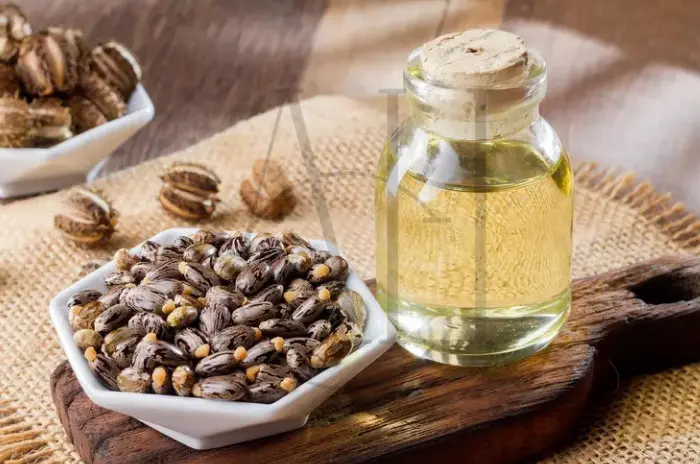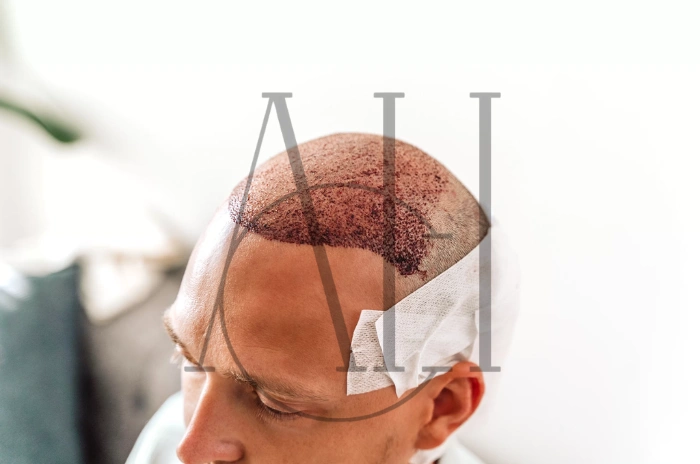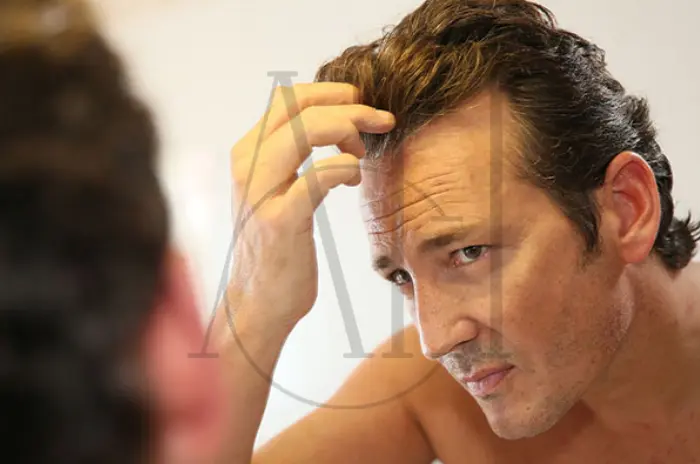Hair growth depends heavily on proper nutrition, especially protein rich foods for hair growth. Your hair follicles require specific nutrients to produce strong, healthy strands that resist breakage and shedding. Understanding which foods for hair growth provide the most benefit can transform your hair health naturally.
Many people struggle with hair loss without realizing their diet plays a crucial role. Protein forms the foundation of hair structure, while vitamins and minerals support the growth process. This comprehensive guide explores the best protein rich foods for hair growth and essential nutrients your hair needs to thrive.
Table of Contents
ToggleWhy Protein Rich Food Help for Hair Growth
Hair follicles are made of protein
Your hair follicle consists primarily of keratin, a structural protein that gives hair its strength and elasticity. Each strand contains approximately 95% protein, making adequate protein intake essential for healthy hair growth. Without sufficient protein, your body cannot produce the building blocks necessary for strong, resilient hair.
Protein provides the amino acids that form keratin chains within each hair strand. These amino acids include cysteine, methionine, and lysine, which create the cross-links that give hair its structure. When you consume protein rich foods for hair growth, you supply your follicles with these essential components.
The hair growth cycle depends on continuous protein synthesis within the follicle. During the anagen (growth) phase, which lasts 2-7 years, follicles actively produce new hair cells using available amino acids from your diet.
Low protein may cause hair loss
Protein deficiency can trigger telogen effluvium, a condition where hair prematurely enters the resting phase and sheds excessively. This type of hair loss typically occurs 2-3 months after protein intake drops significantly. Your body prioritizes protein for vital organs, leaving hair follicles with insufficient resources.
Studies show that consuming less than 0.8 grams of protein per kilogram of body weight can lead to hair thinning and increased shedding. Hair loss from protein deficiency often affects the entire scalp rather than specific areas like male pattern baldness.
Foods for hair growth that are rich in complete proteins help prevent this type of shedding by ensuring your follicles receive all essential amino acids. Complete proteins contain all nine essential amino acids your body cannot produce independently.
Signs Your Hair Loss is Linked to Low Protein
Recognizing protein-related hair loss helps you address the root cause rather than treating symptoms. Hair becomes noticeably thinner, weaker, and more prone to breakage when protein intake is inadequate. You may notice increased hair in your shower drain or on your pillow.
Hair loss from low protein often accompanies other symptoms like fatigue, slow wound healing, and muscle weakness. Your hair may also lose its natural shine and feel rough to the touch. These changes typically occur gradually over several months.
Blood tests measuring serum albumin and total protein levels can confirm protein deficiency. However, hair changes often appear before blood markers become abnormal, making dietary assessment crucial for early detection.
How Protein Deficiency Leads to Hair Loss
Keratin & Amino Acids – Building Blocks of Hair
Keratin production requires specific amino acids that come from protein rich foods for hair growth. Cysteine, the most abundant amino acid in hair, forms disulfide bonds that give hair its strength and curl pattern. Eggs for hair growth provide excellent cysteine content along with other essential amino acids.
Protein metabolism breaks down dietary proteins into individual amino acids, which your body then reassembles into keratin. This process requires adequate protein intake and proper digestion. Poor protein quality or insufficient quantity can disrupt keratin formation.
Essential amino acids like lysine, methionine, and threonine cannot be produced by your body and must come from food sources. Foods for hair growth that contain complete proteins ensure you receive all necessary amino acids for optimal hair structure.
Iron’s Role in Oxygen Supply to Hair Follicles
Iron for hair health works synergistically with protein to support healthy hair growth. Iron deficiency anemia can cause diffuse hair thinning even when protein intake is adequate. Hair follicles require oxygen-rich blood to maintain active growth phases.
Fatty fish hair health benefits include both high-quality protein and heme iron, which your body absorbs more efficiently than plant-based iron sources. Combining iron-rich foods with vitamin C enhances absorption and supports follicle function.
Red blood cells carry oxygen to hair follicles using iron-containing hemoglobin. When iron stores are low, your body redirects available iron to essential organs, leaving hair follicles oxygen-deprived and unable to sustain normal growth.
Collagen Supplements vs. Dietary Protein for Hair
Collagen hair strength supplements have gained popularity, but whole food protein sources often provide superior benefits. Collagen peptides supply specific amino acids like glycine and proline, but lack some essential amino acids found in complete proteins.
Protein rich foods for hair growth like fish, eggs, and legumes provide all amino acids needed for both collagen and keratin production. Your body can synthesize collagen when given adequate building blocks from varied protein sources.
Research suggests that consuming diverse protein sources supports hair health more effectively than isolated collagen supplements. Foods for hair growth provide additional nutrients like vitamins and minerals that work synergistically with protein.
Top Protein Foods for Hair Growth
Eggs give protein and biotin
Eggs for hair growth rank among the best protein rich foods for hair growth because they provide complete protein plus biotin-rich foods for hair. One large egg contains approximately 6 grams of high-quality protein and 10 micrograms of biotin, supporting both hair structure and growth.
Biotin in eggs helps your body metabolize amino acids and fatty acids essential for hair health. Egg whites contain avidin, which can bind biotin, but cooking eggs neutralizes this effect. Eggs for hair growth work best when consumed regularly as part of a balanced diet.
The sulfur-containing amino acids in eggs for hair growth directly contribute to keratin formation. Cysteine from eggs helps create the disulfide bonds that give hair its strength and elasticity.
Meat and beans as strong protein sources
Lean meats provide complete proteins with all essential amino acids needed for hair growth. Protein from meat sources has high biological value, meaning your body can efficiently use these amino acids for hair follicle function.
Beans and hair protein offer an excellent plant-based alternative with additional fiber and nutrients. Legumes like lentils, chickpeas, and black beans provide substantial protein while delivering folate and iron for hair health.
Combining different protein sources throughout the day ensures optimal amino acid profiles for hair growth. Meat and beans as strong protein sources can be alternated to provide variety while meeting your hair’s nutritional needs.
Fish gives protein and omega‑3
Fatty fish hair health benefits come from high-quality protein combined with omega‑3 for hair growth support. Salmon, mackerel, and sardines provide complete proteins while delivering anti-inflammatory omega-3 fatty acids that support scalp health.
Omega‑3 for hair includes EPA and DHA, which help maintain healthy hair follicles and may reduce inflammation that can contribute to hair loss. These fatty acids also support sebum production, keeping hair and scalp moisturized.
Fish gives protein and omega‑3 in optimal ratios for hair health. The protein supports structure while omega-3s enhance follicle function and potentially extend the growth phase of the hair cycle.
Greek Yogurt – Probiotics and Protein for Hair Strength
Greek yogurt for hair strength provides both protein and probiotics that support overall health and nutrient absorption. One cup of Greek yogurt contains 15-20 grams of protein, making it an excellent choice for meeting daily protein needs.
Probiotics in Greek yogurt for hair strength may improve gut health and enhance nutrient absorption from other foods for hair growth. Better digestion means more efficient utilization of amino acids and vitamins for hair growth.
Greek yogurt for hair strength also contains B vitamins, including B5 (pantothenic acid), which supports hair follicle health and may help prevent premature graying.
Chicken, turkey, fish and dairy
Lean poultry provides excellent protein with lower saturated fat compared to red meat. Chicken, turkey, fish and dairy form the foundation of many successful hair-healthy diets because they offer complete amino acid profiles.
Dairy products like milk and cheese contribute both protein and calcium, which plays a role in hair follicle development. Fish and dairy combinations provide complementary nutrients that support multiple aspects of hair health.
Turkey contains particularly high levels of L-cysteine, an amino acid crucial for keratin production. Including variety among chicken, turkey, fish and dairy ensures comprehensive nutritional support for hair growth.
Nutrients in Foods That Boost Hair
Biotin helps keratin build hair
Biotin helps keratin build hair by serving as a cofactor in amino acid metabolism and fatty acid synthesis. This B vitamin supports the production of keratin, the primary structural protein in hair strands.
Biotin-rich foods for hair include eggs, nuts, seeds, and organ meats. While true biotin deficiency is rare, marginal deficiencies may contribute to hair thinning and brittle hair texture.
Biotin works synergistically with other B vitamins to support cellular metabolism in hair follicles. Adequate intake ensures optimal keratin production and may improve hair strength and elasticity.
Iron and vitamin C help healthy blood flow
Iron and vitamin C help healthy blood flow to hair follicles by supporting hemoglobin production and enhancing iron absorption. Vitamin C converts plant-based iron into a more absorbable form, making this combination particularly important for vegetarians.
Iron for hair health requires adequate vitamin C for optimal absorption and utilization. Foods like citrus fruits, berries, and leafy greens provide vitamin C that enhances iron uptake from other sources.
Healthy blood flow delivers oxygen and nutrients to actively growing hair follicles. Iron and vitamin C work together to maintain this crucial nutrient delivery system throughout the scalp.
Omega‑3 fatty acids improve scalp health
Omega‑3 fatty acids improve scalp health by reducing inflammation and supporting healthy sebum production. These essential fats help maintain the scalp’s natural moisture barrier and may reduce symptoms of dry, flaky scalp.
Omega‑3 for hair includes alpha-linolenic acid (ALA) from plant sources and EPA/DHA from fish sources. Each type provides different benefits, with fish-derived omega-3s showing stronger anti-inflammatory effects.
Incorporating fatty fish hair health foods like salmon and mackerel provides optimal omega-3 ratios for scalp and hair health. Plant sources like flaxseeds and walnuts complement fish intake for comprehensive omega-3 nutrition.
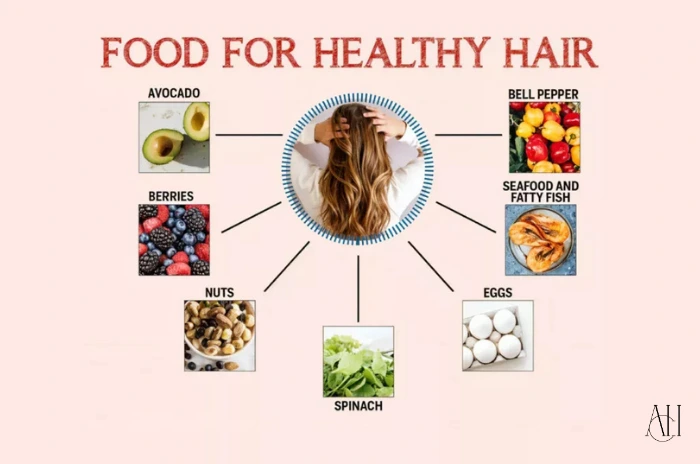
Foods to Limit for Better Hair Health
Avoid ultra‑processed and high‑sugar foods
Foods linked to hair loss often include ultra-processed items high in refined sugars and unhealthy fats. These foods can trigger inflammation and disrupt hormone balance, potentially contributing to hair thinning and loss.
High sugar intake may interfere with protein absorption and utilization, reducing the effectiveness of protein rich foods for hair growth. Refined carbohydrates can also cause blood sugar spikes that may affect hair follicle health.
Ultra-processed foods typically lack the vitamins and minerals essential for hair health while providing empty calories. Limiting these foods creates space in your diet for more nutritious foods for hair growth.
Choose whole foods for nutrients
Choose whole foods for nutrients to maximize the benefits of your hair-healthy diet. Whole foods provide nutrients in their natural forms with better bioavailability compared to processed alternatives.
Whole foods retain their natural fiber, which supports gut health and nutrient absorption. Better digestion means more efficient utilization of protein rich foods for hair growth and vitamins for hair growth.
Processing often removes or destroys sensitive nutrients like vitamins and antioxidants that support hair health. Choosing whole foods ensures you receive the full spectrum of nutrients needed for optimal hair growth.
Plant-Based Protein Foods to Boost Hair Health
Beans & Lentils – Protein and Biotin for Hair Growth
Beans & Lentils provide excellent plant-based protein along with biotin and other B vitamins essential for hair health. One cup of cooked lentils contains approximately 18 grams of protein and significant amounts of folate and iron.
Lentils, tofu and spinach offer protein in combinations that create complete amino acid profiles when consumed together. This makes plant-based diets viable for supporting healthy hair growth when properly planned.
Beans and hair protein work particularly well when combined with grains or nuts to ensure all essential amino acids are available. This combination supports keratin production as effectively as animal-based proteins.
Soybeans – A Vegetarian Hair-Strengthening Protein
Soybeans provide one of the few complete plant proteins, containing all essential amino acids needed for hair structure. Soy products like tofu, tempeh, and edamame offer versatile ways to include this protein in your diet.
Soybeans also contain isoflavones, which may help regulate hormone levels that affect hair health. These compounds might provide protective effects against certain types of hair loss, particularly in women.
The high-quality protein in soybeans supports keratin production while providing additional nutrients like folate and iron for hair health. Regular consumption can effectively support plant-based hair health goals.
Nuts & Seeds – Zinc and Protein for Less Hair Fall
Nuts & Seeds provide protein, healthy fats, and zinc selenium hair minerals that support follicle function. Zinc deficiency can cause hair thinning and increased shedding, making these foods particularly valuable.
Nuts and seeds hair growth benefits include vitamin E, which supports scalp circulation, and selenium, which protects against oxidative damage. Pumpkin and sunflower seeds are especially rich in zinc and protein.
Seeds like chia and hemp provide complete proteins along with omega-3 fatty acids. Nuts and seeds hair growth support comes from their comprehensive nutrient profiles that address multiple aspects of hair health.
Lentils, tofu and spinach offer protein
Lentils, tofu and spinach offer protein in a combination that provides complete amino acid profiles plus additional hair-supporting nutrients. This trio demonstrates how plant foods can effectively support hair growth goals.
Spinach adds iron for hair health and folate, while tofu provides complete protein and isoflavones. Lentils contribute protein, biotin, and additional iron to create a synergistic combination.
Plant-based eaters can rely on lentils, tofu and spinach combinations to meet their protein needs while supporting optimal hair health through diverse nutrient intake.
Quinoa gives all essential amino acids
Quinoa gives all essential amino acids making it a complete protein source that rivals animal products. This ancient grain provides approximately 8 grams of protein per cooked cup along with fiber and minerals.
Quinoa contains particularly high levels of lysine, an amino acid often limited in plant proteins. This makes quinoa especially valuable for vegetarians and vegans focusing on hair growth nutrition.
The complete amino acid profile in quinoa supports keratin production while providing complex carbohydrates for sustained energy. Quinoa gives all essential amino acids needed for optimal hair structure and growth.
Why Diet Matters for Healthy Hair
Hair needs protein like collagen
Hair needs protein like collagen because both structures rely on amino acid building blocks for strength and integrity. Your body must continuously synthesize new proteins to maintain hair growth and structure.
Collagen hair strength depends on adequate amino acid availability from dietary sources. While your body can produce collagen, this process requires sufficient protein intake to provide necessary building materials.
Hair needs protein for the ongoing replacement of keratin in growing strands. Unlike collagen in skin, which turns over slowly, hair proteins must be continuously renewed as hair grows approximately half an inch per month.
Low protein can lead to weak hair
Low protein can lead to weak hair because insufficient amino acid availability compromises keratin quality and quantity. Hair becomes brittle, prone to breakage, and may lose its natural elasticity and shine.
Protein deficiency affects hair texture before visible hair loss occurs. You may notice increased tangling, difficulty styling, and overall fragility as keratin quality declines.
Low protein intake forces your body to prioritize protein allocation to vital organs, leaving hair follicles with inadequate resources for strong keratin production. This prioritization explains why hair problems often signal broader nutritional deficiencies.
Vitamins and Minerals That Support Hair Growth
Spinach – Iron and Folate for Hair Repair
Spinach provides exceptional iron for hair health along with folate and other B vitamins that support cellular division in hair follicles. Leafy greens for hair like spinach offer one of the most concentrated sources of hair-supporting nutrients.
Iron deficiency ranks among the most common nutritional causes of hair thinning, particularly in women. Spinach provides non-heme iron that, when consumed with vitamin C sources, supports healthy blood flow to follicles.
Folate in spinach supports DNA synthesis and cellular repair within hair follicles. This B vitamin works with other nutrients to maintain the rapid cell division required for continuous hair growth.
Sweet Potatoes – Beta-Carotene for Scalp Health
Sweet potatoes and hair thickness benefits come from high beta-carotene content, which your body converts to vitamin A. Vitamin A supports sebum production and helps maintain healthy scalp conditions.
Beta-carotene acts as an antioxidant that protects hair follicles from oxidative stress. Sweet potatoes provide this nutrient in a form that’s less likely to cause vitamin A toxicity compared to supplements.
Vitamin A from sweet potatoes helps regulate the hair growth cycle and supports the health of cells that line hair follicles. Adequate intake may contribute to thicker, healthier-appearing hair.
Berries – Antioxidants to Prevent Hair Damage
Berries for hair strength provide powerful antioxidants that protect hair follicles from environmental damage and oxidative stress. Berries for hair antioxidants include vitamin C, anthocyanins, and other protective compounds.
Vitamin C in berries supports collagen production and enhances iron absorption from plant sources. Berries for hair strength also provide folate and other B vitamins that support cellular metabolism in follicles.
Antioxidants in berries may help protect against premature hair aging and maintain natural hair color longer. Regular consumption of berries for hair antioxidants supports overall scalp and hair health.
Vitamin E supports scalp circulation
Vitamin E supports scalp circulation by protecting blood vessels and supporting healthy blood flow to hair follicles. This fat-soluble vitamin also acts as an antioxidant that protects cellular membranes in the scalp.
Vitamin E deficiency, while rare, can contribute to hair loss and scalp problems. Adequate intake from foods like nuts, seeds, and vegetable oils supports optimal follicle function.
Scalp circulation delivers oxygen and nutrients essential for hair growth while removing metabolic waste products. Vitamin E helps maintain the vascular health necessary for this crucial nutrient exchange.
Vitamin D links to hair growth cycle
Vitamin D links to hair growth cycle regulation by influencing the genes that control follicle development and cycling. Vitamin D receptors are present in hair follicles, suggesting direct involvement in hair biology.
Vitamin D deficiency has been associated with alopecia areata and other forms of hair loss. While the exact mechanisms remain under study, adequate vitamin D levels appear important for normal hair cycling.
Hair growth cycle phases depend on complex hormonal and genetic signals, with vitamin D playing a regulatory role. Maintaining adequate levels through sunlight exposure and diet supports optimal follicle function.
Vitamin C helps iron absorption and collagen
Vitamin C helps iron absorption and collagen synthesis, making it doubly important for hair health. This vitamin enhances the absorption of non-heme iron from plant sources while supporting collagen production in the scalp.
Vitamin C deficiency can lead to scurvy, which includes hair problems among its symptoms. Adequate intake ensures proper collagen formation and optimal iron utilization for hair growth.
Collagen in blood vessels and scalp tissue depends on vitamin C for proper synthesis. This vitamin also regenerates other antioxidants like vitamin E, providing comprehensive protection for hair follicles.
Vitamin A makes sebum for scalp health
Vitamin A makes sebum for scalp health by supporting the sebaceous glands that produce natural oils. Proper sebum production keeps the scalp moisturized and creates an optimal environment for hair growth.
Vitamin A deficiency can lead to dry, flaky scalp conditions that may interfere with healthy hair growth. However, excessive vitamin A intake can also cause hair loss, making balanced intake important.
Sebum production requires adequate vitamin A to maintain the lipid composition that protects and moisturizes both scalp and hair shafts. This natural conditioning helps prevent breakage and maintains hair flexibility.
Zinc and selenium protect your scalp
Zinc and selenium protect your scalp from oxidative damage while supporting various enzymatic processes essential for hair growth. Zinc selenium hair minerals work together to maintain follicle health and function.
Zinc deficiency can cause significant hair loss and changes in hair texture. This mineral supports protein synthesis, immune function, and wound healing – all important for healthy hair growth.
Selenium acts as an antioxidant that protects against environmental damage while supporting thyroid function. Thyroid hormones significantly influence hair growth, making selenium indirectly important for hair health.
Magnesium’s Role in Hair Growth Cycles
Magnesium supports over 300 enzymatic reactions in the body, including those involved in protein synthesis and energy metabolism within hair follicles. This mineral may help regulate the hair growth cycle and support follicle function.
Magnesium deficiency can contribute to inflammation and stress responses that may negatively affect hair growth. Adequate intake from foods like leafy greens, nuts, and whole grains supports overall follicle health.
Hair growth cycles require significant energy and metabolic activity, processes that depend on adequate magnesium availability. This mineral supports the ATP production needed for active hair growth phases.
Pumpkin and sunflower seeds
Pumpkin and sunflower seeds provide concentrated sources of zinc, vitamin E, and healthy fats that support hair health. These seeds offer convenient ways to add hair-supporting nutrients to your daily diet.
Pumpkin seeds contain particularly high levels of zinc, which supports protein synthesis and immune function. Sunflower seeds provide vitamin E and selenium for antioxidant protection.
Both pumpkin and sunflower seeds can be easily incorporated into meals, snacks, or smoothies to boost your intake of hair-supporting nutrients. Their nutrient density makes them excellent choices for hair-focused nutrition.
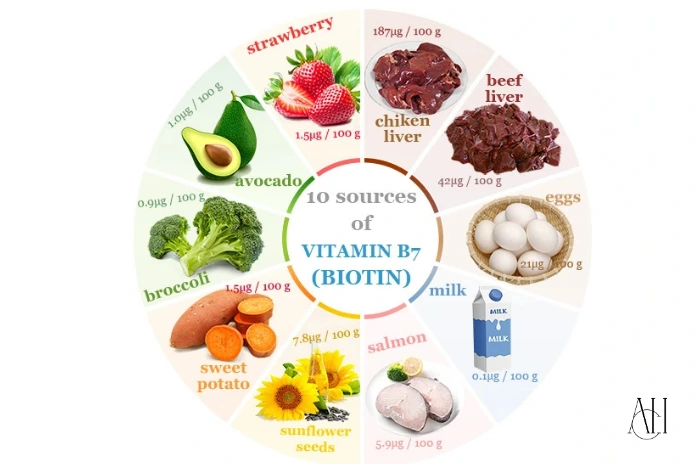
Healthy Fats for Shiny, Strong Hair
Avocados – Vitamin E and Healthy Hair Follicles
Avocados for shiny hair provide monounsaturated fats, vitamin E, and biotin in a combination that supports both hair structure and appearance. Vitamin E in avocados protects cell membranes in hair follicles from oxidative damage.
Healthy fats in avocados help your body absorb fat-soluble vitamins like A, D, E, and K that support hair health. Avocados for shiny hair also provide folate and potassium for overall follicle function.
Monounsaturated fats from avocados may help reduce inflammation that can contribute to hair loss. The creamy texture and mild flavor make avocados easy to incorporate into hair-healthy meals.
Greek Yogurt – Protein and Vitamin B5 for Hair Growth
Greek yogurt for hair strength combines high-quality protein with vitamin B5 (pantothenic acid), which supports hair follicle health and may help prevent premature graying. The probiotics in yogurt may also support nutrient absorption.
Vitamin B5 in Greek yogurt helps convert nutrients into energy within hair follicles while supporting the health of hair shaft cells. This vitamin may also help maintain natural hair color and texture.
Protein in Greek yogurt for hair strength provides amino acids needed for keratin synthesis while the creamy texture makes it versatile for meals and snacks. Regular consumption supports consistent protein intake for hair health.
Olive Oil – Boosts Shine and Reduces Damage
Olive oil provides monounsaturated fats and vitamin E that can improve hair appearance and protect against environmental damage. While primarily used topically, dietary olive oil consumption supports overall hair health.
Vitamin E in olive oil acts as an antioxidant that protects hair follicles from free radical damage. The monounsaturated fats may help reduce inflammation that can contribute to hair problems.
Extra virgin olive oil retains more beneficial compounds compared to refined versions. Using olive oil in cooking and salad dressings provides a simple way to include hair-supporting fats in your diet.
Supplements and Extra Tips
Biotin foods like eggs and nuts
Biotin foods like eggs and nuts provide this essential B vitamin in natural forms that your body can easily utilize. Biotin-rich foods for hair offer advantages over supplements by providing complementary nutrients that enhance biotin function.
Eggs provide biotin along with complete protein and other B vitamins that work synergistically. Nuts offer biotin plus vitamin E, healthy fats, and minerals that support comprehensive hair health.
Natural biotin sources rarely cause the side effects sometimes associated with high-dose supplements. Biotin foods like eggs and nuts provide sustainable, balanced nutrition for long-term hair health support.
Balance matters—don’t overdo vitamins
Balance matters in hair nutrition because excessive intake of certain vitamins can actually cause hair loss. Vitamin A toxicity, for example, can trigger hair shedding, while too much selenium can cause brittle hair.
Moderation in supplementation prevents nutrient imbalances that may interfere with hair growth. Getting vitamins for hair growth from whole foods reduces the risk of excessive intake while providing balanced nutrition.
Whole food sources of vitamins come with natural limits and complementary nutrients that promote safe, effective intake. Balance matters more than high doses for sustainable hair health improvement.
Vitamins That Reverse Hair Weakness
Biotin (B7) – Does It Really Reduce Hair Fall?
Biotin (B7) supports keratin production and may help reduce hair fall in people with biotin deficiency, but evidence for benefits in people with adequate biotin levels is limited. Biotin-rich foods for hair provide safer, more balanced nutrition than high-dose supplements.
True biotin deficiency is rare but can cause significant hair loss when it occurs. Biotin supplements may help in cases of actual deficiency but won’t necessarily improve hair in people with normal biotin status.
Biotin foods like eggs, nuts, and seeds provide this vitamin along with other nutrients that support hair health. Focusing on biotin-rich foods for hair ensures adequate intake without risking supplement-related side effects.
Vitamin D3 – Stimulating Dormant Hair Follicles
Vitamin D3 may help stimulate dormant hair follicles and support the transition from resting to active growth phases. Vitamin D receptors in hair follicles suggest this vitamin plays a direct role in hair biology.
Vitamin D deficiency has been linked to various forms of hair loss, including alopecia areata. Correcting deficiency through sunlight exposure, supplements, or fortified foods may help restore normal hair growth patterns.
Seasonal hair changes may relate to vitamin D fluctuations, with some people experiencing increased shedding during months with limited sun exposure. Maintaining adequate vitamin D levels year-round may help stabilize hair growth.
Vitamin E – Combats Oxidative Stress on Hair
Vitamin E protects hair follicles from oxidative stress caused by environmental pollutants, UV radiation, and metabolic processes. This antioxidant vitamin helps maintain healthy cellular function within the scalp and follicles.
Oxidative stress can damage the DNA in hair follicle cells and interfere with normal growth cycles. Vitamin E helps neutralize free radicals before they can cause cellular damage that leads to hair problems.
Topical and dietary vitamin E both contribute to hair health, with dietary intake supporting systemic antioxidant status while topical application may provide direct scalp benefits. Nuts, seeds, and vegetable oils offer excellent dietary sources.
Diet vs. Supplements for Hair Regrowth
Animal vs. Plant-Based Proteins for Hair Health
Animal proteins provide complete amino acid profiles with high biological value, making them efficient sources for hair growth support. Plant-based proteins can be equally effective when properly combined to ensure complete amino acid intake.
Animal vs. plant-based proteins for hair health each offer unique advantages. Animal sources provide readily available amino acids, while plant sources offer additional fiber, antioxidants, and phytonutrients that support overall health.
Combining different protein sources throughout the day ensures optimal amino acid availability regardless of dietary preference. Both animal and plant proteins can effectively support hair health when consumed as part of a balanced diet.
When to Consider Hair Growth Supplements
Hair growth supplements may be beneficial when dietary intake is insufficient or absorption is impaired due to medical conditions. Blood testing can identify specific deficiencies that warrant targeted supplementation.
Supplements work best as adjuncts to a healthy diet rather than replacements for good nutrition. Whole foods provide nutrients in forms that are often better absorbed and utilized compared to isolated supplements.
Medical supervision is recommended when considering hair growth supplements, especially for people taking medications or with underlying health conditions. Professional guidance helps ensure safe, effective supplementation strategies.
Risks of Over-Supplementation (e.g., Selenium Toxicity)
Selenium toxicity can cause hair loss, brittle nails, and other serious health problems when intake exceeds safe levels. Over-supplementation often occurs when people take multiple supplements without considering cumulative intake.
Fat-soluble vitamins like A, D, E, and K can accumulate in body tissues and cause toxicity when taken in excessive amounts. Hair loss paradoxically can result from too much of certain nutrients intended to support hair growth.
Food sources of nutrients rarely cause toxicity due to natural limits and balanced nutrient profiles. Supplement safety requires careful attention to dosages and potential interactions between different products.
| Nutrient | Food Sources | Hair Benefits | Daily Needs |
|---|---|---|---|
| Protein | Eggs, fish, beans, nuts | Keratin production, follicle strength | 0.8g per kg body weight |
| Iron | Spinach, red meat, legumes | Oxygen delivery to follicles | 8-18mg (varies by age/gender) |
| Biotin | Eggs, nuts, sweet potatoes | Keratin synthesis | 30 micrograms |
| Vitamin C | Berries, citrus, bell peppers | Iron absorption, collagen production | 75-90mg |
| Omega-3 | Fatty fish, walnuts, flaxseeds | Scalp health, inflammation reduction | 1-2g EPA/DHA |
| Zinc | Pumpkin seeds, oysters, beef | Protein synthesis, follicle function | 8-11mg |
| Vitamin D | Sunlight, fortified foods | Hair cycle regulation | 600-800 IU |
FAQ : Best Protein-Rich Foods for Hair Growth and Strength
Why is protein important for hair growth?
Protein forms the structural foundation of hair since approximately 95% of each hair strand consists of keratin, a protein that requires adequate amino acid intake to maintain strength and growth.
What are the signs that hair loss might be linked to low protein intake?
Hair loss from low protein typically involves diffuse thinning, increased breakage, loss of shine, and hair that feels weak or brittle, often accompanied by fatigue and other signs of protein deficiency.
Which animal-based protein foods are best for hair growth?
Eggs for hair growth, fatty fish hair health sources like salmon, lean poultry, and Greek yogurt for hair strength provide complete amino acid profiles with additional hair-supporting nutrients like biotin and omega-3 fatty acids.
What are some good plant-based protein sources for healthy hair?
Beans and hair protein sources, quinoa, nuts and seeds hair growth foods, and lentils, tofu and spinach combinations provide complete amino acids when properly combined throughout the day.
Besides protein, what other nutrients in food are vital for hair health?
Iron for hair health, vitamins for hair growth including biotin and vitamin C, omega‑3 for hair support, and zinc selenium hair minerals all play crucial roles in maintaining healthy hair growth and strength.
How does a balanced diet, not just protein, contribute to hair health?
Foods for hair growth work synergistically – vitamin C enhances iron absorption, healthy fats support vitamin absorption, and antioxidants protect follicles from damage while protein provides structural building blocks.
Do collagen supplements directly help with hair growth more than dietary protein?
Collagen hair strength supplements provide specific amino acids but protein rich foods for hair growth offer complete amino acid profiles plus additional nutrients that support overall hair health more comprehensively.
When should one consider hair growth supplements instead of relying solely on diet?
Hair growth supplements may be appropriate when blood tests reveal specific deficiencies, dietary restrictions limit nutrient intake, or medical conditions impair absorption of vitamins for hair growth from food sources.

